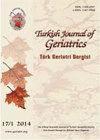目标导向和常规液体管理对老年股骨近端甲手术患者下腔静脉塌陷指数和术后并发症影响的比较
IF 0.3
4区 医学
Q4 GERIATRICS & GERONTOLOGY
Turkish Journal of Geriatrics-Turk Geriatri Dergisi
Pub Date : 2023-03-01
DOI:10.29400/tjgeri.2023.329
引用次数: 0
摘要
导言:在老年髋部骨折患者围手术期避免高血容量和低血容量的不良影响是很重要的。在我们的研究中,我们旨在比较术中目标导向和常规液体治疗对这些患者下腔静脉塌陷指数、术后并发症和30天死亡率的影响。材料与方法:60例65岁及以上行股骨近端甲手术的患者。患者随机分为两组;目标导向和常规治疗组。目标导向治疗组患者使用MostcareTm (Vygon, VytechHealth, Padova, Italy)血流动力学监测仪进行监测。以脉压变化<10%,脑容量变化<13%为目标进行液体治疗。常规治疗组按4-2-1规则进行输液处理。麻醉前及出院前,超声检查下腔静脉坍缩指数。结果:常规组术后下腔静脉塌陷指数明显高于常规组。两组给予的总晶体液体体积相似,目标定向治疗组使用更多的胶体。目的导向治疗组术中尿量明显增加。目标导向治疗组术后住院时间较短。两组在30天死亡率和术后并发症方面无显著差异。结论:根据我们的研究,术中靶向液体治疗提供了最佳的术后血管内容量,缩短了术后住院时间。关键词:股骨干骨折;下腔静脉;血流动力学监测;液体治疗;术后并发症。本文章由计算机程序翻译,如有差异,请以英文原文为准。
Comparison Of The Effects Of Intraoperative Goal Directed And Conventional Fluid Management On The Inferior Vena Cava Collapsibility Index And Postoperative Complications In Geriatric Patients Operated From Proximal Femoral Nail Surgery
Introduction: Avoiding undesirable effects of hyper- and hypovolemia is important in geriatric hip fracture patients perioperatively. In our study, we aimed to compare the effects of intraoperative goal directed and conventional fluid therapy on inferior vena cava collapsibility index, postoperative complications and 30-day mortality in these patients. Materials and Methods: 60 patients aged 65 and over who underwent proximal femoral nail surgery were included in the study.Patients were randomized into two groups; Goal Directed and Conventional Therapy groups. Patients in the Goal Directed Therapy Group were monitored with a MostcareTm (Vygon, VytechHealth, Padova, Italy) haemodynamic monitor. Fluid therapy was applied by targeting Pulse Pressure Variation <10%, Stroke Volume Variation <13%. In the Conventional Therapy group fluid management was administered to the patients according to the 4-2-1 rule. Before anesthesia and leaving the recovery room, inferior vena cava collapsibility index measurements was performed by ultrasonography. Results: Postoperative inferior vena cava collapsibility index was higher in the Conventional group. Total administered crystalloid fluid volumes were similar in both the groups and more colloids were used in the Goal Directed Therapy group. Intraoperative urine output was observed more in the Goal Directed Therapy group. Postoperative hospital stay was shorter in the Goal Directed Therapy group. There was no significant difference in terms of 30-day mortality and postoperative complications. Conclusion: According to our study, intraoperative targeted fluid herapy provides optimal postoperative intravascular volume and shortened the postoperative hospital stay. Keywords: Femoral Fractures; Vena Cava, Inferior; Hemodynamic Monitoring; Fluid Therapy; Postoperative Complications.
求助全文
通过发布文献求助,成功后即可免费获取论文全文。
去求助
来源期刊

Turkish Journal of Geriatrics-Turk Geriatri Dergisi
GERIATRICS & GERONTOLOGY-
CiteScore
0.60
自引率
0.00%
发文量
46
审稿时长
6-12 weeks
期刊介绍:
Turkish Journal of Geriatrics is a peer-reviewed journal. Official language of the journal is English. Turkish Journal of Geriatrics invites submission of Original Articles based on clinical and laboratory studies. Review Articles are published only after the invitation from the Editorial Board.
 求助内容:
求助内容: 应助结果提醒方式:
应助结果提醒方式:


